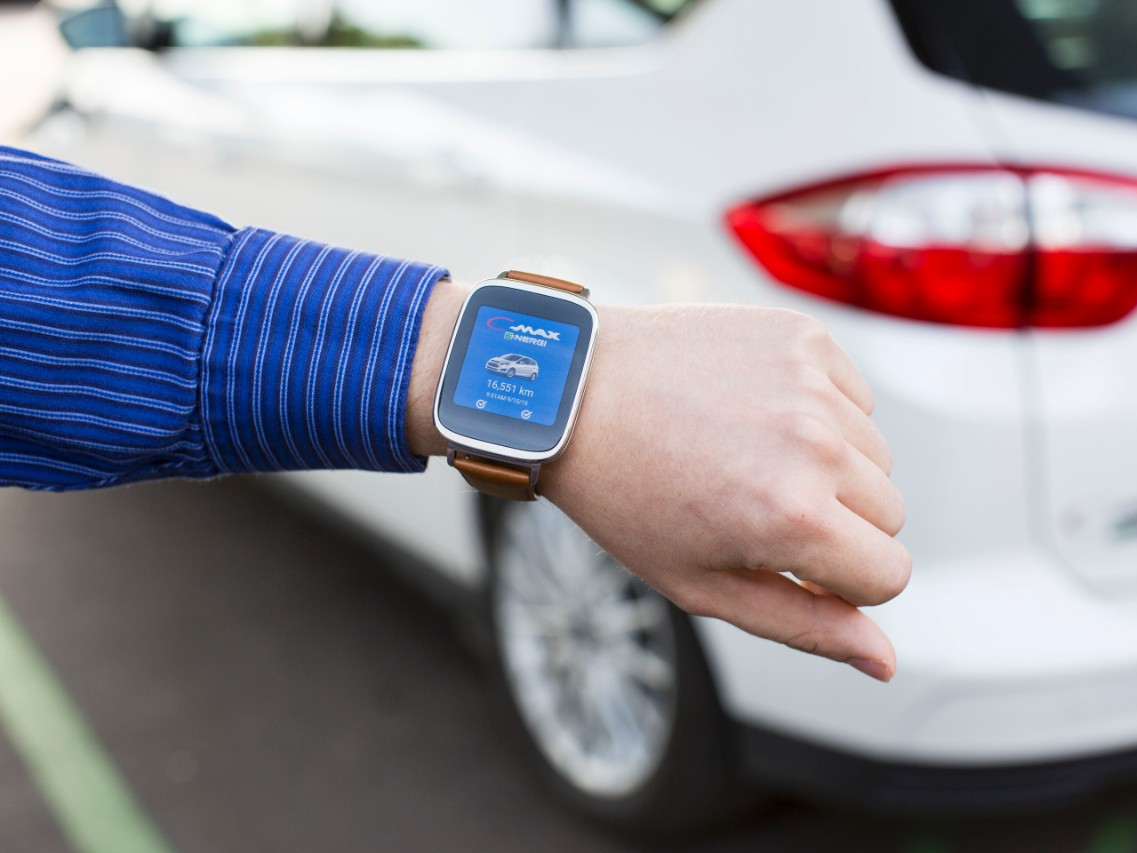Ford's working on increasing communication between your car and wearable

Ford is looking to increase communication between your car and wearable, as it begins testing in a new lab. Wearables, like Android Wear-powered smartwatches, can gather a lot of information about users, and Ford wants to utilize that to make its vehicles even smarter and safer. Some examples of how Ford looks to tap into the data include letting the car know that the driver didn't get a lot of sleep, and having it enable some additional driver-assisted technologies.
Beyond that, Ford is looking at ways to signal a driver using semi-autonomous features that they may need to take full control of the vehicle again. For example, if there was an accident or construction ahead, Ford could make your wrist vibrate in order to alert you to take over again. This technology is still in the lab phase, so it's not likely that your next car will offer it, but it is still great to see Ford working to make vehicles smarter and safer for everyone.
Press release:
New Ford Lab Integrates Wearables and Vehicles; Ford Looks at Linking Health Data to Driver-Assist Technology
- As more consumers embrace wearable devices such as smart watches, glasses and fitness trackers, Ford is opening the Automotive Wearables Experience lab at its Research and Innovation Center in Dearborn, Michigan
- Potential smart watch applications include linking health data to active vehicle driver-assist features to enable these technologies to be more aware of the driver behind the wheel – particularly when that person is stressed or sleepy; new app challenge seeks innovative ways to measure in-vehicle health metrics
- Wearable innovations are part of Ford Smart Mobility, the plan to take the company to the next level in connectivity, mobility, autonomous vehicles, the customer experience, and data and analytics
DETROIT, Jan. 11, 2016 – The connection between what you wear and what you drive is
getting stronger with help from Ford's new wearables research laboratory. Here, scientists and engineers are working to integrate wearable devices and vehicles to enable driver-assist technologies to be more aware of the driver behind the wheel – particularly when that driver is stressed or sleepy.
"As more consumers embrace smart watches, glasses and fitness bands, we hope to develop future applications that work with those devices to enhance in-car functionality and driver awareness," said Gary Strumolo, global manager for vehicle design and infotronics, Ford Research and Advanced Engineering.
Researchers at the new Automotive Wearables Experience laboratory housed in the Ford Research and Innovation Center in Dearborn, Michigan, are examining the potential to link vital health information to in-vehicle technologies, including lane-keeping assist and Blind Spot Information System.
Be an expert in 5 minutes
Get the latest news from Android Central, your trusted companion in the world of Android
Lane-keeping assist, for instance, could become more sensitive if a smart watch sends data to the vehicle that infers the driver didn't get enough sleep the previous night. Or, if a driver's heart rate increases as traffic intensifies, the vehicle's adaptive cruise control or Blind Spot Information System could increase the distance between vehicles – giving the driver some breathing room.
"Wearable technology integrated with the vehicle allows for more accurate biometric data to stream continuously and alert active driver-assist systems to become more sensitive if the driver shows signs of compromised health or awareness," said Strumolo.
App challenge This winter, an app developer challenge co-sponsored by Ford and Henry Ford Health System seeks innovative technology to measure in-vehicle health metrics.
The challenge invites Ford and Henry Ford Health System employees to submit app concepts that use vehicles and wearable devices as components – providing an effective health and wellness program for customers and patients of all ages and conditions.
Submissions open Jan. 20, and finalists for the first phase of the competition will be announced in March. Winners will earn a total of $10,000 in prizes.
Wearable innovations are part of Ford Smart Mobility – the plan to take Ford to the next level in connectivity, mobility, autonomous vehicles, the customer experience, and data and analytics.
Semi-autonomous driving applications The ability to measure wakefulness and health data including blood pressure, blood glucose and heart rate via wearable technology also could benefit semi-autonomous driving features.
The wearables lab is examining ways to signal a driver using semi-autonomous features of the potential need to take driving control back from the vehicle. If there were road construction or an accident ahead, a situation requiring a human at the wheel, the technology could send a wrist vibration or chimes, or even activate flashing lights on the dash.
Voice control, customer experience Researchers are testing voice control for the smart watch version of MyFord® Mobile, which allows Ford drivers to remotely start, lock, unlock and locate their vehicle via their watch app. The lab is integrating voice commands to the app to allow for smart watch owners to use these features without touching their watch or phone.
Another customer-focused experiment the lab is working on involves augmented reality optics, or smart glasses, and the dealership experience. Customers would wear smart glasses as they guide themselves through a showroom, seeing additional information about vehicles they're interested in. Looking through glasses could offer a wide range of features from technical specifications to a virtual test drive.
"The potential in this space is endless," said Strumolo. "We're evaluating many different wearable devices and applications – everything from helping to keep Ford drivers healthier and more aware behind the wheel to offering an enhanced customer experience at our dealerships."

